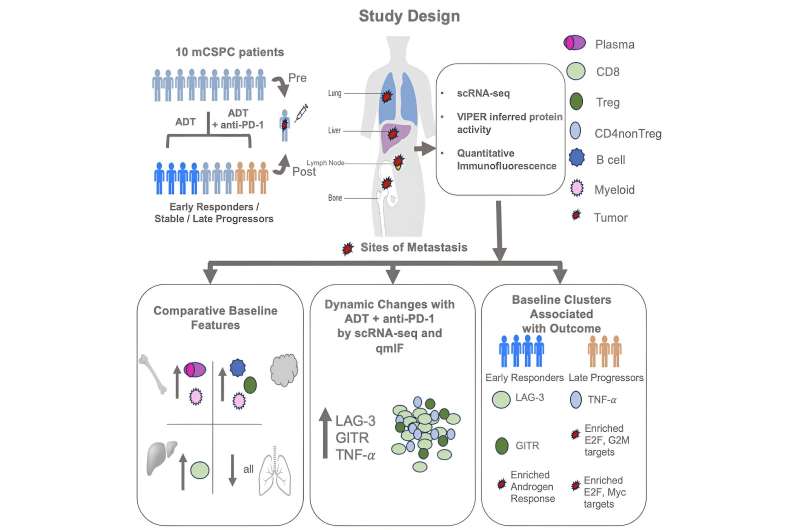This article has been reviewed according to Science X's editorial process and policies. Editors have highlighted the following attributes while ensuring the content's credibility:
fact-checked
peer-reviewed publication
trusted source
proofread
For metastatic prostate cancer, immunotherapy may have unexpected potential

Immunotherapy has been disappointing as a prostate cancer treatment, but a new Columbia study suggests that the powerful treatments have potential when the disease starts to spread.
The study, published in Cancer Cell, found that metastatic prostate tumors contain a rich variety of immune cells that can potentially be roused by immunotherapy into attacking the cancer.
"What we see is that at baseline, many of the right immune cells are already there, but they're just not attacking the tumors," says Aleksandar Obradovic, MD, Ph.D., associate research scientist at the Vagelos College of Physicians and Surgeons and one of the lead authors of the study.
"This is an exciting finding because prostate cancer has this reputation for being a 'cold' tumor, altogether hidden from the immune system. Our study suggests that, in metastases, this isn't always the case. And that combining hormone therapy with immunotherapy further stimulates the anti-tumor immune cells, with potential for further optimization and improvement in patient outcomes."
Reading the tumor microenvironment
Before the Columbia study, no one had looked deeply into the microenvironment of untreated metastatic prostate cancers, deterred in part by the difficulty of obtaining samples suitable for single-cell RNA sequencing, particularly before treatment was initiated.
In a clinical trial of men with metastatic prostate cancer, the Columbia researchers also found that hormone therapy combined with immunotherapy triggered an influx of even more immune cells into the tumor's microenvironment. To address this knowledge gap, the Columbia researchers designed a clinical trial for a small number of men to obtain such samples before and after treatment with standard chemo-hormonal therapy and immunotherapy.
"One goal of this study was to deeply profile what the microenvironment looks like and then see what happened when the tumors were treated with the combination of chemo-hormonal therapy and immune therapies," Obradovic says.
These analyses were also made possible with new cutting-edge bioinformatics tools, previously developed by the Columbia researchers, that were able to reveal many types of cells in the tumor microenvironment not distinguishable by standard techniques.
Immune cell signatures suggest possible treatments
In addition to finding a diverse community of immune cells within metastatic tumors, varying from organ to organ, the researchers discovered that some subgroups of immune cells predicted worse response to treatment.
Some of the patients' tumors, for example, were filled with T cells that produce TNF-alpha, which has been associated with suppression of the anti-tumor immune response. "We see that patients with a lot of those cells had worse outcomes," Obradovic says, "and it's possible we could potentially improve outcomes in these patients by adding FDA-approved TNF alpha inhibitors to their regimen."
The researchers are planning additional trials to test these ideas and are continuing to analyze samples from patients spanning the range from primary through late metastatic prostate cancer to gain a more complete understanding of the evolution of these tumors' microenvironment.
More information: Jessica E. Hawley et al, Anti-PD-1 immunotherapy with androgen deprivation therapy induces robust immune infiltration in metastatic castration-sensitive prostate cancer, Cancer Cell (2023). DOI: 10.1016/j.ccell.2023.10.006
















